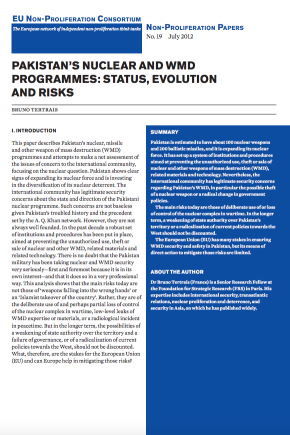Pakistan's Nuclear and WMD Programmes: Status, Evolution and Risks
Pakistan is estimated to have about 100 nuclear weapons and 200 ballistic missiles, and it is expanding its nuclear force. It has set up a system of institutions and procedures aimed at preventing the unauthorized use, theft or sale of nuclear and other weapons of mass destruction (WMD), related materials and technology. Nevertheless, the international community has legitimate security concerns regarding Pakistan’s WMD, in particular the possible theft of a nuclear weapon or a radical change in government policies. The main risks today are those of deliberate use of or loss of control of the nuclear complex in wartime. In the longer term, a weakening of state authority over Pakistan’s territory or a radicalization of current policies towards the West should not be discounted. The European Union (EU) has many stakes in ensuring WMD security and safety in Pakistan, but its means of direct action to mitigate those risks are limited.

